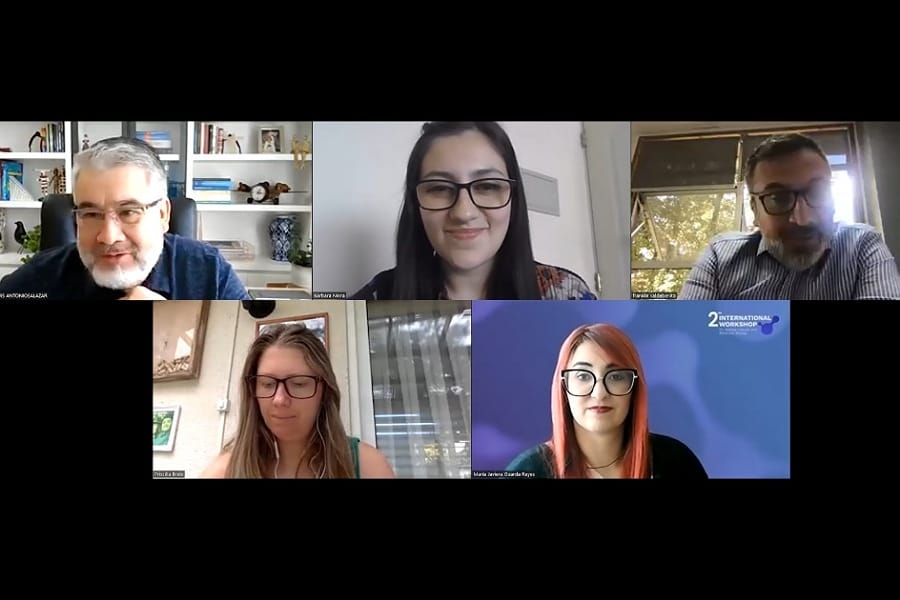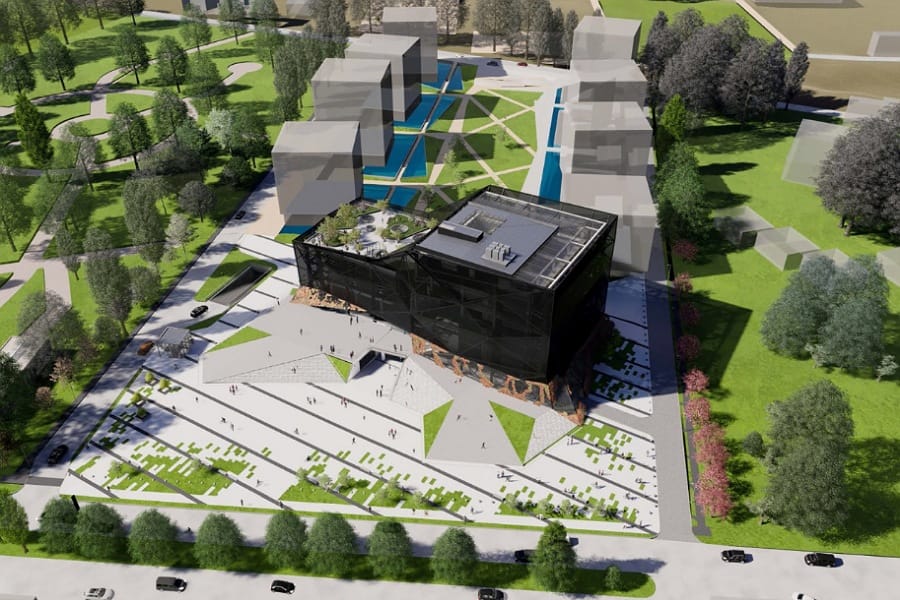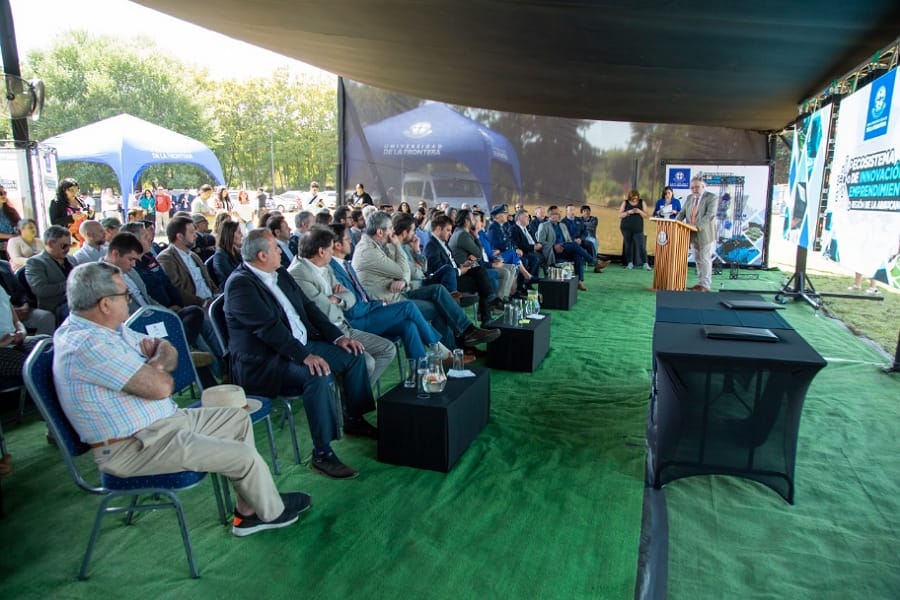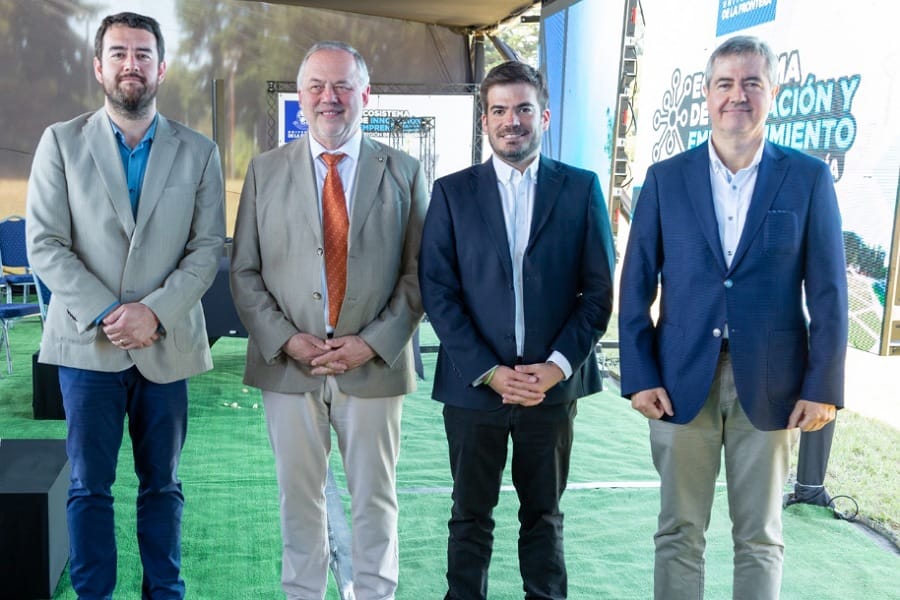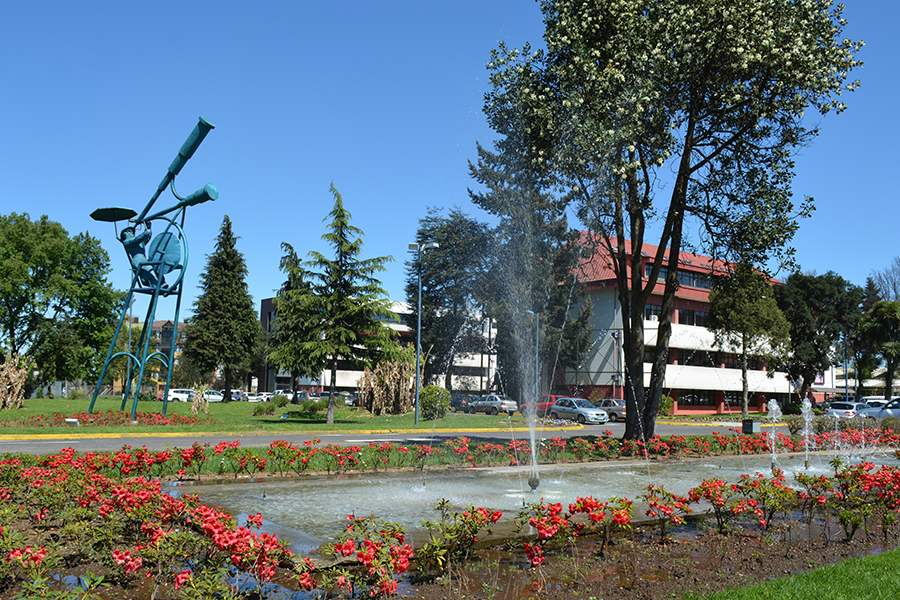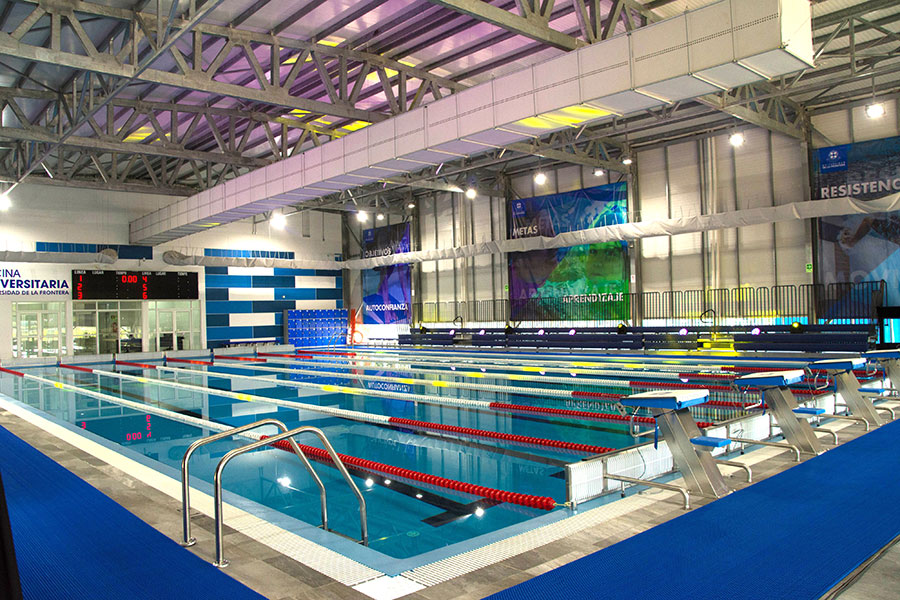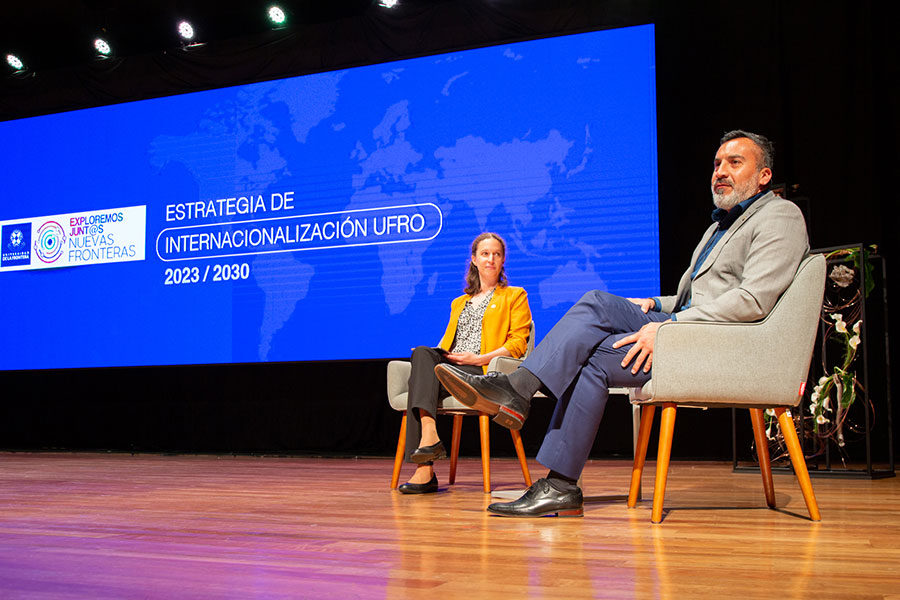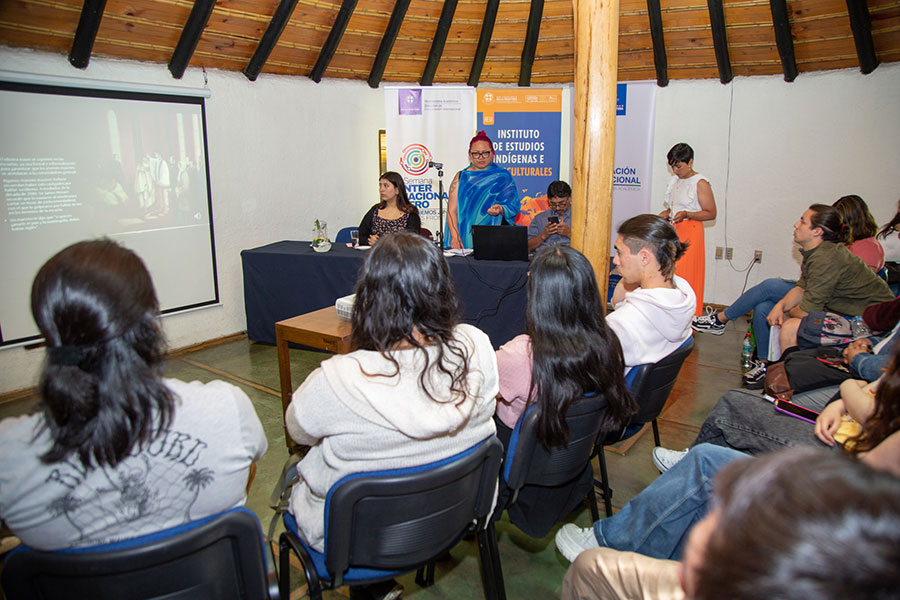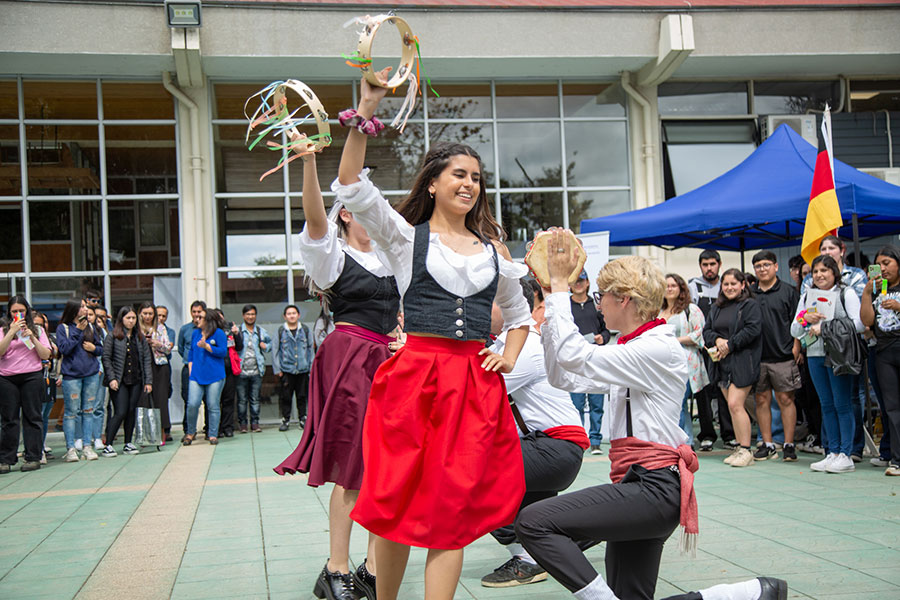|
The Doctoral Program in Science with specialization in Applied Cellular and Molecular Biology of UFRO organized the online workshop and awarded the best oral presentations and posters. |
The idea for the International Workshop on Applied Cellular and Molecular Biology came up during the COVID-19 pandemic, and its second version, organized by the Doctoral Program in Science with specialization in Applied Cellular and Molecular Biology of the Universidad de La Frontera (UFRO), brought together participants of 22 Chilean and international universities. The workshop consisted of four different symposia, three related to the fields of the doctoral program, and one that showed the students how to introduce the results of their research to the productive sector. Besides the students, also researchers and experts of foundations and national and international research centres, companies for research, innovation and bioentrepreneurship, and public and private health institutions were among the participants. “This important number of national and international participants was possible thanks to one of the good things the pandemic brought us, which is the use of online-platforms. The idea for this event came up in 2021, with the idea of actively maintaining and increasing our national and international partnerships during the pandemic. But also as an important opportunity for our students, graduates and academics to present their lines of research,” explained Dr. Luis Salazar Navarrete, the director of the program. AWARDED PRESENTATIONS During the workshop, the participating experts and students from Argentina, Canada, Columbia, Brazil, Cuba, Costa Rica, France, Mexico, Spain, Panama and Chile had the chance to attend 17 conferences, 14 oral presentations and 28 poster presentations. As part of the workshop, the three best oral presentations and poster presentations were awarded. Among the oral presentations, Daniel López Hernández from Universidad de La Frontera (Chile) reached the first place, Paula Marroquín Morales and Daniela Suárez Bernal from Monterrey Institute of Technology and Higher Education (Mexico) the second place, and Paulina Cabrera Herreros from Universidad de La Frontera (Chile) the third place. Among the poster presentations, Katherine Izquierdo-Fiallo from Universidad de Santiago (Chile) achieved the first place, Consuelo Arias Lattes from Universidad San Sebastián (Chile) the second place, and Roberto Brito Mellado from Universidad de La Frontera (Chile) the third place. Dr. Alejandra Chaparro Padilla, an academic from the Chilean university Universidad de Los Andes was in charge of the inauguration conference of the international event and presented “Oral Precision Medicine. New Perspectives”. The director of the Institute of Innovation and Entrepreneurship of UFRO (iDEAUFRO), Carlos Isaacs Bornand, was in charge of the final conference, where he presented the topic “Managing emerging technologies: New tools to move from lab to market”. Written and translated by: UFRO Communications Office
|
|
Regional, local and university authorities got together at the Andrés Bello Campus of Universidad de La Frontera to launch this important project. |
The launch of the first Innovation and Entrepreneurship Ecosystem in the La Araucanía Region is a new milestone regarding the development of the region and the construction of its future. The university Universidad de La Frontera (UFRO) initiated this initiative with support of the regional government and the Production Development Corporation (CORFO). The idea is to create a space where different local, national and international actors, both public and private, can get together for the co-creation and systematic development of solutions and scientific and technological entrepreneurships with potential for global scaling. Regional, local and university authorities, as well as representatives of technology companies, public development agencies, R&D&I centres, centres, start-ups and business accelerators, gathered at the Andres Bello Campus of UFRO to launch this important project that aims at developing a knowledge-based economy to promote innovative solutions from the Araucanía Region for Chile and the world. The launch took place at the future location of the main building of the ecosystem, a modern and sustainable infrastructure with technological components, with open workspaces and spaces for the promotion of innovation and entrepreneurship. This will be the first of several structures that will be added to the ecosystem in the long term. “This new project is an important qualitative milestone, with which we will bring the private and public sector, the regional government, the municipalities, the neighbourhood councils, etc. together. Our idea is to bring together all the productive sectors in order to promote and add value to our region, which really needs this. This initiative is a competitive alternative for developing and retaining local talents with knowledge of the territory, as well as for attracting foreign creative talents, who coordinate and connect with all the stakeholders in charge of the productive development,” explained Dr. Eduardo Hebel Weiss, the rector of UFRO. “This will be the first technology park in the La Araucanía Region. This is going to be a space as we have seen it in different parts of the world. It will solve different issues from the point of view of knowledge generation, technological development, and how we add value to the different products of our region, in order to have a balanced productive development that allows the La Araucanía Region to progress,” said Luciano Rivas Stepke, the governor of the La Araucanía Region. “The Rector spoke to us some time ago in order to be part of this venture and to create all kinds of agreements, which will allow us to support this ecosystem with all of our regional ministries. This great project, which can turn our region into a pioneer regarding technology and innovation, does not only need certain infrastructures, but also certain skills and human capital,” commented the regional presidential delegate, José Montalva Feuerhake. On this event, Eduardo Hebel Weiss, the rector of Universidad de La Frontera, signed several strategic cooperation agreements with Luciano Rivas Stepke, the governor of the La Araucanía Region; with the Production Development Corporation (CORFO), through its strategic affairs manager, Claudio Maggi; and with José Montalva, the regional presidential delegate. These alliances are a support and give relevance to the proposal of a regional ecosystem, and allow to work and progress together in this initiative.
Once the ecosystem starts working, its main purpose is to attract, retain and provide creative human talent; to facilitate relevant resources, both in terms of infrastructure and services that promote productive and economic co-development of high value; to promote a permanent knowledge flow within the community of the ecosystem; to increase the interaction between companies, institutions and individuals; and to strengthen the cooperation and synergies for the development of competitive businesses. Which structure does this ecosystem have? The project considers the cooperative work in a network of different nodes in different physical spaces throughout the region and is designed for the coexistence and systematic cooperation between companies, technology start-ups, universities and public agencies for production development, with the aim of progressing in the development of innovative solutions and promoting science and technology-based ventures with the potential for global scaling. Although the official launch of this initiative took place in January 2023, the development started much earlier, with the installation of the first Node of the Ecosystem, located in one of the University’s buildings in Prat 332, in the city centre of Temuco. Several technology companies, entrepreneurs, public development agencies and technology centres linked to this initiative already work there, giving shape to this promising venture. Currently, the University installed a University Committee for this project that focuses on a participatory process to analyse, propose and define a management model for the Ecosystem. An international consultant expert in the design and development of such global initiatives accompanies the process to guarantee and to learn at first hand about the best practices, required partnerships and related outreach models that must be considered in the implementation and consolidation of transformational initiatives such as this one. Escrito por: UFRO Communications Office
|
|
Universidad de La Frontera got 24 project proposals approved in the FONDECYT Initiation Projects competition of the Chilean National Research and Development Agency (ANID). |
“We are proud of this remarkable result,“ said Dr. Rodrigo Navia Diez, the vice-rector for Research and Graduate Studies of Universidad de La Frontera (UFRO) regarding the results of the latest FONDECYT Initiation Projects competition, in which the university is in 4th place out of 51 at the national level and in 2nd place among the state universities. “This does not only position us among the best universities in Chile, it also allows us to support our young researchers in almost all fields of knowledge,” the university authority added, considering that the projects are from 16 different groups of studies, four of them in inter- and transdisciplinary fields of research. The research director, Dr. María Elena Arias, recognized and appreciated the efforts and persistence of the researchers who presented their initiatives in the different fields of knowledge and who made this great position of UFRO possible. “The 24 approved projects of our researchers show the success of the measures and support by the Vice-rectorate for Research and Graduate Studies, implemented directly or indirectly through the Research Office. At the Research Office, we want to congratulate the ones who are taking on this new challenge over the next three years,” she concluded. APPROVED PROJECTS
Source: Vice-rectorate for Research and Graduate Studies, UFRO |
|
Dr. Eduardo Hebel Weiss, the rector of UFRO, emphasized that this milestone will convert the Sports Complex Andrés Bello into one of the best-equipped university sports complexes in the south of Chile. |
After a long time of waiting, on January 25, the Universidad de La Frontera (UFRO) finally received the authorization by the Regional Ministry of Health to operate and use the new semi-Olympic indoor swimming pool of the university. The rector of UFRO, Dr. Eduardo Hebel Weiss, announced this great news in his annual account speech for the period of 2022, where he emphasized that this milestone will convert the Sports Complex Andrés Bello into one of the best-equipped university sports complexes in the south of Chile. “It has been a long journey to get to this moment, in which our university has its own indoor swimming pool for the students, staff and academics. However, it would not have been possible to reach something like this alone. I am very thankful for all the conversations with the directors and authorities of the municipality of Temuco and the regional Ministry of Health, what made possible this milestone, which we waited for so long,” the rector said. The rector also gave special thanks to Roberto Neira, the mayor of the city of Temuco; Mauricio Cruz, the deputy mayor; Andrés Cuyul, the regional minister of health, and Marcelo Besnier, the director of public works. He also thanked the vice-retorates of UFRO for their work. The semi-Olympic swimming pool has six 25-meter lanes, two pools for rehabilitation, timing touch panels and a scoreboard, and is suitable for wheelchair users and people with reduced mobility. In addition, the facility has telescopic bleachers for 250 people and uses solar energy to heat the water and for the LED-illumination. Escrito por: UFRO Communications Office
|
|
The first International Week of Universidad de La Frontera brought a high number of participants together in different activities and allowed visualising the internationalisation development of the university. |
“We presented our Internationalisation Strategy UFRO, with which we want to strengthen our partnerships, establish new alliances, connect with other entities and find our common interests in order to grow and keep developing and strengthening our university in the international context,” said Dr. Eduardo Hebel Weiss, the Rector of the Universidad de La Frontera (UFRO), at the inauguration of the International Week UFRO. The event, organised by the Vice-rectorate for Academic Affairs and the International Affairs Office of UFRO, invited the different units and actors to be part of the programme full of activities related to institutional internationalisation. The Vice-rector for Academic Affairs, Dr. Renato Hunter Alarcón, pointed out that UFRO has very strong partnerships throughout the world. “We do have the required vision, effort and dedication to create strong links across our borders and we will keep working on that, promoting respect and support across the nations,” he commented. In this context, he estimates that the 260 agreements in force with 179 different institutions might multiply over the next years, promoting and strengthening the mobility and collaborative work with academics from different countries in Europe, such as the Netherlands, Serbia and Lithuania, etc. INTERNATIONALISATION STRATEGY UFRO In a collaborative effort, the Vice-rectorate for Academic Affairs and the Vice-rectorate for Research and Graduate Studies carried out workshops and training sessions in collaboration with the International Affairs Office and the Office for Innovation and Technology Transfer. In addition, the university established a Commission to work on the guidelines. The new Internationalisation Strategy will support initiatives from 2023 to 2030 in the fields of excellence in graduate studies with an international vision, research and innovation with territorial relevance, internationalisation of the curriculum, and academic mobility. In this context, Dr. Lorena Vieli, the director of the International Affairs Office, pointed out: “With these strategies, we are able to define the role of internationalisation and the participation of the related units and their contributions. The preparation process not only led us to the official Internationalisation Strategy, but also helped us to further develop our skills and capacities.” Franklin Valdebenito Godoy, the director of the Office for Innovation and Technology Transfer, added that the process has been very significant, “because it has allowed us to include the vision of the Vice-rectorates, to have a shared vision and to strengthen different areas. Now, our task is to strengthen the pillars of internationalisation and to drive the work forward”. OPPORTUNITY FAIR One of the activities carried out during the International Week UFRO was the Opportunity Fair with 20 stands with information on study and internship opportunities abroad, academic mobility programmes, as well as international initiatives and organisations. The Vice-rector for Administration and Finances, Jorge Petit-Breuilh Sepúlveda, commented: “Since 2021, we are planning the construction of different infrastructures. We already have three major projects: one has to do with a sustainable campus, another one with a smart campus and the third one is the idea of a Citizens Square to promote the unity and fellowship within the university community.” “Each of these challenges,” he explained, “helps us to develop projects that go in line with standards of sustainability and functionality, and to create physical spaces of encounter and connection that also allow us to position ourselves in the international context.” CULTURE AND ACTIVITIES The programme of the International Week UFRO included talks and international networking opportunities with the participation of national and international guests and student groups, cultural activities, international films, etc. A delegation from the University Te Wānanga in New Zealand participated in a talk about intercultural education that was organized by the Faculty of Education, Social Sciences and Humanities and the Institute for Indigenous and Intercultural Studies of UFRO. At the same time, several other international experts held talks and seminars at the doctoral level, to strengthen the fields of high-impact research and international projects. In addition, the university community had the chance to enjoy the international cinema, the Science Café, and different encounters and learning opportunities. With regard to the internationalisation of the curriculum, the university organised a COIL – Collaborative Online International Learning – workshop to continue strengthening that methodology that allows connecting different programmes and subjects with teachers from all over the world. This activity was organised with the support of the Vice-rectorate for Undergraduate Affairs and the Office of Curricular and Teacher Development. CRUCH MEETING At the same time, within the framework of the first International Week UFRO, the Internationalisation Committee of the Council of Rectors of Chilean Universities (CRUCH) met at UFRO for its plenary session. One of the topics addressed at this meeting was the experience of the University of Göttingen in Germany and the University of Talca in Chile in the project ‘LiveSciences3 - transnational and digital linked life sciences’. Other important parts of the programme of the International Week UFRO were the presentations of DAAD and DAHZ, the celebration of the tenth anniversary of the German-Argentinean University Centre, a discussion on collaboration perspectives and possibilities for Chilean and German universities, and the workshop ‘Internationalisation practices at home: bringing together different world knowledge’. Written and translated by: UFRO Communications Office
|





